US Occupy protesters clash with police at Oakland port
- Published
- comments
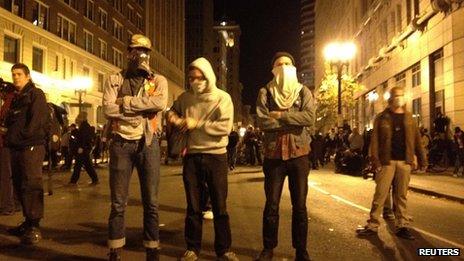
Masked protesters - and police - were on the streets of Oakland throughout much of the night
Protests have continued throughout the night in Oakland, California, as police clashed with demonstrators from the Occupy Wall Street group.
Police fired tear gas as a group within the protesters lit a fire and threw stones and bottles at officers.
The late-night clashes followed a day of action against "corporate greed", which saw a mass protest march in central Oakland.
Protesters shut down the city's port, one of the busiest in the US.
Around 30 people were reportedly arrested in the early hours of Thursday, and at least four protesters were brought to hospital.
Protests on Wednesday were largely peaceful until around midnight local time (07:00 GMT), when some of the protesters reportedly lit a barricade on fire.
Afterwards, police fired tear gas and "flash bang" grenades near the main plaza, where Occupy Wall Street protesters have been camping.
Veterans protest
Hundreds of city workers, including teachers, in Oakland, joined the call for a strike.
The crowds also stopped traffic at a junction where a military veteran was seriously injured last week as protesters clashed with police.
Ex-Marine Scott Olsen, 24, is recovering in an Oakland hospital after being struck on the head with a tear gas canister fired by police.
That incident catapulted Oakland, which is on San Francisco Bay, to the centre of the national Occupy Wall Street movement and has spurred fresh demonstrations across the US.
Elsewhere in the US on Wednesday:
Police in Philadelphia arrested nine protesters who staged a sit-in inside the lobby of Comcast, America's largest cable firm
In New York, about 100 military veterans marched in uniform and stopped in front of the city's stock exchange, where there was a heavy police presence
In Boston, college students and union workers marched on Bank of America offices and the statehouse to protest over the student debt crisis
'Death to capitalism'
Organisers of the latest Occupy Oakland protest said they wanted to disrupt operations at the nation's fifth busiest port, which handles about $39bn (£24bn) a year in imports and exports.
"At this time, maritime operations remain effectively shut down," the Port of Oakland officials said at a news conference late on Wednesday.
Alastair Leithead says the march on the port came at the end of a day of protests
They said operations would resume "when it is safe to do so".
Oakland police estimated that about 3,000 demonstrators were gathered at the port. Police said 4,500 people had marched across the city on Wednesday.
But a spokesman for the protest movement, who only gave his name as Aaron, told the BBC: "It is an order of magnitude larger than any protests we've seen and we've seen some big ones in the last week."
"There are pockets here and there going on for what seems like miles. I have heard people say 20,000, 30,000... it's impossible to tell."
But city officials later said that only about 150 protesters remained at the port late on Wednesday night and some 900 in the city's main square.
A number of businesses, including several banks, were shut during the protests, which were largely peaceful earlier in the day.
One protester, Nicole Warner, said the atmosphere had been good.
"My daughter and I were at the port all evening."
"It was the most beautiful sight I'd ever seen, thousands upon thousands of people piling over the bridge in a totally peaceful way."
Explaining why she had joined the demonstration she said: "People are losing their homes and they don't have jobs."
"The banks, the corporate greed and the people in government are letting the economy go down the toilet."
City officials stressed that there were isolated incidents of violence led by groups of anarchists among the protesters.
Some Occupy Oakland protesters returned to scrub the walls of a Wells Fargo bank after they had been defaced with graffiti, the Los Angeles times reported.
Oakland Mayor Jean Quan, who had been criticised for her handling of earlier protests, called for calm.
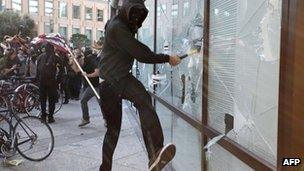
City officials blamed anarchists for "isolated" incidents of violence
The demonstration, which included students, families with young children and union members, began with a rally outside city hall.
One large protest banner read: "Occupy Everything, death to capitalism."
Oakland officials said about 5% of employees had taken the day off, including about 360 teachers.
One teacher at the rally, Brother Muziki, told AFP news agency: "Our classrooms are overcrowded. The banks are being bailed out - but not the schools."
The BBC's Alastair Leithead in Los Angeles says Oakland has a higher than average unemployment rate and suffered badly during the US recession.
The activists have been protesting against a system which they believe favours corporations and the nation's wealthiest 1%.
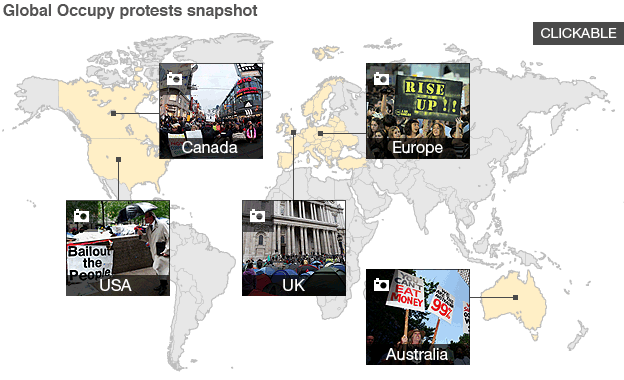
US
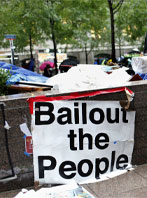
The most high profile protest has been Occupy Wall Street in New York, which began on 17 September. The protesters call themselves "the 99%" and are demanding major reforms of the global financial system by curbing the power of banks and corporations. Protests have also taken place in cities across the US, including Washington DC, Chicago, Los Angeles, San Francisco, Denver, Pittsburgh, Detroit, Houston and Boston. On 15 November, police moved in to clear the Occupy Wall Street protest, earlier they had cleared camps in Portland, Oregon and Oakland, California.
Europe
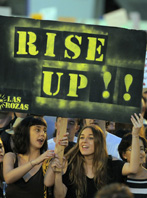
A protest in Madrid's Sol Square began in May and turned into a week-long sit in. Renewed protests in Europe started on 15 October with demonstrations in Rome, Berlin, Frankfurt, Leipzig, Hamburg, Dublin, Bucharest, Zurich and other cities. Demonstrations were largely peaceful, but around 70 people were injured when violence broke out in Rome.
UK
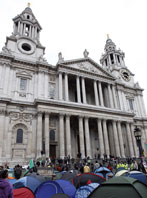
Protests at the London Stock Exchange in solidarity with Occupy Wall Street began on 15 October. After being denied access to Paternoster Square in front of the stock exchange, demonstrators organised a camp of around 150 tents outside St Paul's Cathedral. Protesters were told their camp could remain until the new year, on condition some tents blocking the "public highway" were removed. But the City of London Corporation said it was proceeding with legal action on 16 November, after talks with the protesters broke down.
Canada
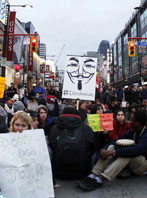
Demonstrations and protest camps began on 15 October in major cities, including Calgary, Halifax, Quebec, Toronto, Vancouver and Victoria. Police have cleared protesters from sites in Halifax and Ontario but campaigners at the biggest camp, in Toronto, have been allowed to remain.
Australia
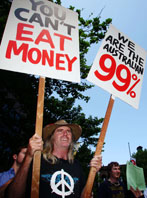
Protests began in Sydney and Melbourne on 15 October. Police forcibly removed around 100 demonstrators from the Melbourne camp on 21 October.
- Published1 November 2011
- Published2 November 2011
- Published27 October 2011